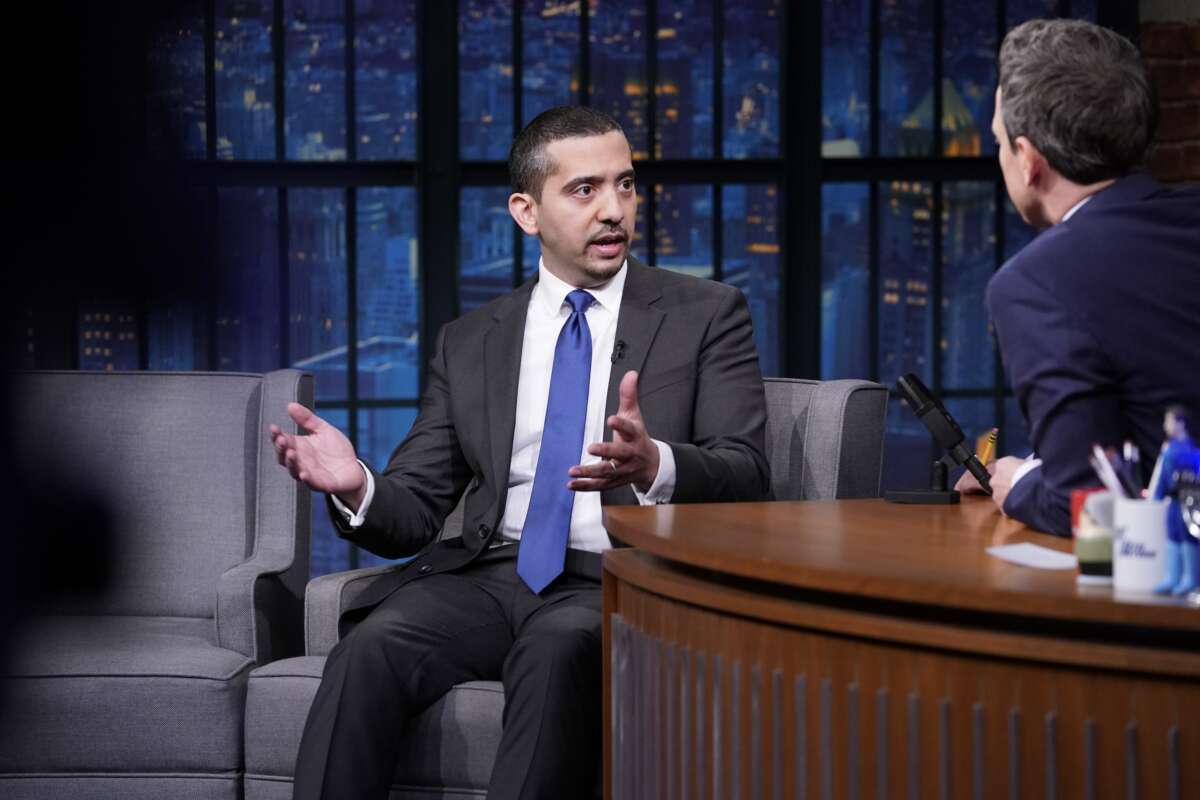MSNBC announced to staff on Thursday that the network is canceling Mehdi Hasan’s weekend show, delivering a major demotion to one of the most prominent and outspoken left-leaning news hosts on a major broadcast outlet on the air.
According to Semafor, which cited two sources familiar with the move, Hasan’s show on the network and on its streaming service, Peacock, has been canceled. “Mehdi Hasan Show” writer Adam Weinstein also confirmed the news on social media. Instead, Semafor reported, Hasan will only appear on air as an analyst or when filling in for another host. The network is expanding host Ayman Mohyeldin’s show to fill in the time slot.
Hasan, who formerly worked for Al Jazeera English and The Intercept, has hosted the “Mehdi Hasan Show” since 2020. He has gained a strong following as a candid and forthright host and interviewer, and clips of him interrogating or debating public figures, often right-wing ones, have frequently gone viral, with fans noting his powerful ability to persuade.
Lately, and in years past, Hasan has been vocal in his criticism of Israel’s military and its apartheid against Palestinians — and of U.S. wars in the Middle East — in a media landscape that is otherwise relentlessly jingoistic, Islamophobic and anti-Palestinian.
Since Israel’s current genocide in Gaza began in October, Hasan has been highlighting the horrific conditions faced by Palestinians in Gaza; challenging Israeli officials on propagandist lies; criticizing the Israeli military strategy for its potential to stoke further violence from Hamas forces against Israelis; and even gesturing toward the accuracy of the word “genocide” and “apartheid” to describe Israel’s ongoing massacre in Gaza and decades-long oppression of Palestinians, which corporate media outlets have strayed far away from in other reporting.
“You accept that right, you’ve killed children?” Hasan asked Israeli Prime Minister Benjamin Netanyahu adviser Mark Regev in a particularly revealing interview earlier this month.
“No I do not,” Regev said. “First of all, you do not know how those people died.”
MSNBC also quietly and briefly took Hasan’s show off the air following Hamas’s attack in October, while taking two of its other Muslim anchors, Mohyeldin and Ali Velshi, out of their anchor roles temporarily. This sparked accusations of Islamophobia among MSNBC leaders from critics.
The reported cancellation of Hasan’s show has similarly caused outrage, with left-wing commentators saying that Hasan was both a unique on screen talent and a critical voice on the left and on the topic of Gaza in the sphere of corporate media.
“[MSNBC], make this make sense,” wrote human rights lawyer Noura Erakat. “[Mehdir Hasan]’s program has felt like an oasis on air and more needed than ever. His program with Mark Regev was a whole class on journalistic method. He should be amplified, not shut down.”
“It is bad optics for MSNBC to cancel [Mehdi Hasan]’s show right at a time when he is vocal for human rights in Gaza with the war ongoing,” wrote Rep. Ro Khanna (D-California). “MSNBC owes the public an explanation for this decision. Why would they choose to do this now?”
Several commentators pointed out the similarity to MSNBC’s 2003 firing of host Phil Donahue, whose prime-time show was canceled after internal documents criticized Donahue for his strong anti-war viewpoints as the U.S. was embarking on its war in Iraq. In an interview with Democracy Now! in 2013, Donahue explained that MSNBC executives would not tolerate anti-war voices on air.
“Well, I think what happened to me, the biggest lesson, I think, is the — how corporate media shapes our opinions and our coverage. This was a decision — my decision — the decision to release me came from far above. This was not an assistant program director who decided to separate me from MSNBC. They were terrified of the antiwar voice. And that is not an overstatement,” he said.
“And if you’re General Electric, you certainly don’t want an antiwar voice on a cable channel that you own; Donald Rumsfeld is your biggest customer,” Donahue continued. “So, by the way, I had to have two conservatives on for every liberal. I could have Richard Perle on alone, but I couldn’t have Dennis Kucinich on alone. I was considered two liberals. It really is funny almost, when you look back on how — how the management was just frozen by the antiwar voice. We were scolds. We weren’t patriotic. American people disagreed with us. And we weren’t good for business.”
Media that fights fascism
Truthout is funded almost entirely by readers — that’s why we can speak truth to power and cut against the mainstream narrative. But independent journalists at Truthout face mounting political repression under Trump.
We rely on your support to survive McCarthyist censorship. Please make a tax-deductible one-time or monthly donation.
